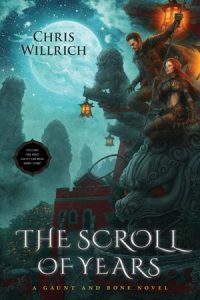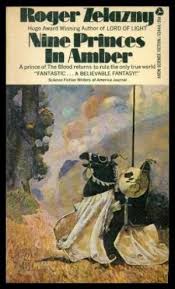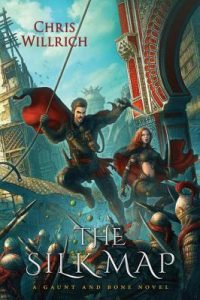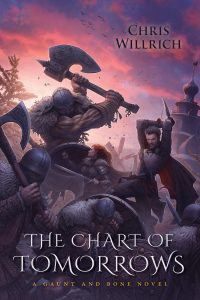Writer Chat: Chris Willrich
 During those long years when I was trying, and mostly failing, to get short stories published, there were a lot of writers publishing at the same time whose work I liked, but there was only one who I wanted to sound like. That writer was Chris Willrich. I’ve gone on to find my own voice for my fiction, one I’m pretty happy with, but I still admire the work of Chris Willrich an awful lot.
During those long years when I was trying, and mostly failing, to get short stories published, there were a lot of writers publishing at the same time whose work I liked, but there was only one who I wanted to sound like. That writer was Chris Willrich. I’ve gone on to find my own voice for my fiction, one I’m pretty happy with, but I still admire the work of Chris Willrich an awful lot.
It was my pleasure to pick his brain a little recently, and today I’m sharing the resulting conversation.
First, why don’t you give us a little background about yourself and your work.
I’m from Washington State originally, though now I live with my family in the San Francisco Bay Area. Though I flirted a bit with science in college, I’ve been pretty much a book person — I was an English major who eventually ended up as a children’s librarian. There there were some interesting odd jobs in between, like working at a newspaper and as a harbor cruise deckhand. I’m writing full time now, for stay-at-home-parent values of “full time.”
I tried writing a little bit of realistic fiction in college but it’s been all fantasy and science fiction since then. I’ve had more success with fantasy, though I love science fiction equally. Those genres are like catnip for a compulsive daydreamer. I think I have an easier time finding a confident voice in fantasy; I haven’t quite figured it out for science fiction.
Because Gardner Dozois recently passed away, I’d like to say I’ll always be grateful to him for buying my first published story, and maybe even more for giving me encouragement and suggestions in some of the rejections I got from him. I think there are lots of people in the field who got their starts because of him, and who benefited from his advice.
 If you were going to direct readers to your fiction, what would you most like them to see?
If you were going to direct readers to your fiction, what would you most like them to see?
“The Sword of Loving Kindness” is free online at Beneath Ceaseless Skies magazine and in some ways it’s pretty representative — it features my recurring characters Gaunt and Bone, and has action, weird magic, philosophical asides, warped humor, and exotic locales. These are a few of my favorite things. If you bounce off that one, there’s a good chance you won’t like my stuff in general, and no worries about that. But if you do like it, maybe try the Gaunt and Bone story “The Mermaid and the Mortal Thing” online at Lightspeed magazine (also free), and maybe consider picking up the first Gaunt and Bone novel, The Scroll of Years (Pyr), which also includes their first story, “The Thief with Two Deaths” (from The Magazine of Fantasy and Science Fiction, June 2000.) And thanks!
Do you have some favorite writers? I’d love for you to discuss what you love about them, and what might be learned from studying their craft.
I’m always going back to Roger Zelazny. I think he combined depth with imagination and a spirit of fun. Beyond that, he was always trying new things with prose. I think the key thing I try to learn from Zelazny is the idea of the narrator as a performer who tries to keep a reader’s interest line by line, maybe even more so than scene by scene. This is especially evident with his first-person-snarky narrators like Corwin of Amber, but you see it all over his work. I read somewhere that he had a goal of a number of sentences per day rather than a number of words per day or a number of hours per day, which may suggest how he focused his attention, and how he managed such sparkling delivery.
 I sometimes think if I ever grow up as a writer I want to be like Ursula K. Le Guin, someone else we’ve recently lost, unfortunately. As with Zelazny there’s playfulness in Le Guin, but there’s also earthy truthfulness about life and how people deal with their good and bad choices. There’s a sense of a very thoughtful mind puzzling out important themes, judiciously. And Le Guin is a master, not just of “show don’t tell,” but of knowing what to show and when, and what to tell and when, and how much of both. Vivid scenes are woven into beautifully phrased narration, “show” becoming “tell” and back again. There is an essay on Le Guin’s web site about showing and telling and other things, here: http://www.ursulakleguin.com/AboutWriting13-OnRulesofWriting.html
I sometimes think if I ever grow up as a writer I want to be like Ursula K. Le Guin, someone else we’ve recently lost, unfortunately. As with Zelazny there’s playfulness in Le Guin, but there’s also earthy truthfulness about life and how people deal with their good and bad choices. There’s a sense of a very thoughtful mind puzzling out important themes, judiciously. And Le Guin is a master, not just of “show don’t tell,” but of knowing what to show and when, and what to tell and when, and how much of both. Vivid scenes are woven into beautifully phrased narration, “show” becoming “tell” and back again. There is an essay on Le Guin’s web site about showing and telling and other things, here: http://www.ursulakleguin.com/AboutWriting13-OnRulesofWriting.html
I’ve recently become a big Terry Pratchett fan — I’ve been going through the Discworld books as read-alouds for my daughter — but I’m afraid I have no brilliant insights as to how he so often managed to be funny and deep at the same time. I do sense he had a largeness of spirit; there was a place in his heart for anyone who wasn’t, say, murdering people or cheating people out of their life savings, and even then he could usually spare a little empathy for the bad guys too. I think the other side of the coin from that largeness of spirit is that the man hated, and I mean hated, injustice, to the degree that I wonder if he cracked jokes about it to keep himself from spontaneously combusting. I think those qualities combine to make Discworld seem real, despite the narration repeatedly reminding you the world’s ultimately being supported by an enormous space turtle.
What writing projects are you working on right now?
I’m working on an epic fantasy with touches of steampunk, the working title of which is Anya Zephyr and the Glass Library.
How many Gaunt and Bone stories have there been? Have you put any thoughts into publishing a collection?
I think about trying to set up a collection sometimes. The main thing holding me back is that I’ve got pretty strong ideas for at least three stories to go along with the initial seven, below, and I’d rather have them all in place before doing a collection. Ideally I’d figure out a good thematic through-line for them, building on what’s gone before, so the compilation could feel somewhat cohesive. I remember reading Michael Moorcock’s Elric stories in book form, and how the books collecting the short works hung together side-by-side with the novels. Same with Fritz Leiber’s Fafhrd and the Gray Mouser, actually, although I haven’t finished reading all of those yet. I’d love to manage the same for Gaunt and Bone, eventually.
 The publication dates of all the Gaunt and Bone tales are listed, but I’ve arranged them in an in-series order in case that’s of interest.
The publication dates of all the Gaunt and Bone tales are listed, but I’ve arranged them in an in-series order in case that’s of interest.
“The Thief with Two Deaths,” The Magazine of Fantasy & Science Fiction, June 2000. Reprinted in Bound for Evil: Curious Tales of Books Gone Bad, (Dead Letter Press 2008.) and The Scroll of Years (Pyr, 2013.)
“The Mermaid and the Mortal Thing,” Flashing Swords Summer Special 2008 Reprinted in Lightspeed Magazine, February 2012. [Free online.]
“The Sword of Loving Kindness, Parts 1 and 2,” Beneath Ceaseless Skies 1 and 2, October 2008. [Free online.]
“King Rainjoy’s Tears,” The Magazine of Fantasy & Science Fiction, July 2002. Reprinted in Fantasy: The Best of 2002 (ibooks, 2003), In Lands That Never Were (Four Walls Eight Windows, 2004) and The Mammoth Book of Warriors and Wizardry (Running Press, 2014.)
“Penultima Thule,” The Magazine of Fantasy & Science Fiction, August 2006.
“What Lies in Ice,” Tales from the Magician’s Skull 1, 2018.
“A Wizard of the Old School,” The Magazine of Fantasy & Science Fiction, August 2007.
The Scroll of Years (Pyr 2013)
The Silk Map (Pyr 2014)
The Chart of Tomorrows (Pyr 2015)
Also, the following stories take place in Gaunt and Bone’s world but are otherwise not related.
“The Lions of Karthagar,” Black Gate15, Spring 2011.
“How the Wicker Knight Would Not Move,” Beneath Ceaseless Skies 99, July 2012.
“Shadowdrop,” Beneath Ceaseless Skies, forthcoming.
Dream writing project – if you could get paid to write anything, what would you most like to draft?
Right now I’m pretty jazzed about Anya Zephyr, above, but I also hope to get all my many Gaunt and Bone ideas written down, and in particular I’d like to send them to a whole bunch more places, including settings inspired by Africa and the Pacific islands, and to take the time to research in depth to make those places feel “right.” I also want them to make some weird stops that are purely from my imagination. I don’t know how far I’ll get but that’s on the wish list. I’d also like to do more space opera stories — I love that genre. And I’d like to tackle hard science fiction, which I admire.
 What do you most like to do when you’re not hunched over your computer screen crafting stories?
What do you most like to do when you’re not hunched over your computer screen crafting stories?
Dear Lord, I am boring. I like to take walks, hang out with the family, and on too-rare occasions run roleplaying games, which I love but don’t have much time for. (This does let me plug that I had the pleasure of doing a roleplaying tie-in book a while back, the Pathfinder Tales novel The Dagger of Trust.)
What are your favorite pieces of advice for other writers? Maybe advice you’d have wanted to hear a few years ago.
Although I love nuts and bolts tips on technique, the most useful advice for me personally has been more “meta.” So here are a few things …
When I was feeling morose about not selling enough of my writing, my wife advised me to just write what I enjoyed, and to stop sweating so much about what I thought editors wanted to buy. That’s when I got going on sword and sorcery, and more adventure-oriented material in general. And paradoxically, or so it seemed, I started selling my work more often than not. But I don’t think it’s really a paradox. If you’re not having much fun with your writing, chances are good your readers won’t be having fun either.
Joanna Russ told a writing class I was fortunate enough to be in something like the following: Writers sometimes fear they haven’t had enough suffering in their lives to have anything worth writing about. Don’t think like that. Life will inevitably serve up more trauma than you’re going to want, like it or not. She also told me, in so many words, not to take myself quite so very seriously. That’s probably the best advice I ever got from a pro.
Science fiction writer Tobias Buckell wrote something online that really resonated for me. I’ve tried to find the original blog post but this librarian must confess failure, alas. The gist of it was: Focus on what’s in your control. Whether or not you sell something is not under your control. How much your work takes off is not under your control. The publishing environment is not under your control. What is under your control? Your work habits, your craft, your enthusiasm. Put most of your energy where it counts, on what’s in your own sphere.
Thanks, Chris!
0 Comments